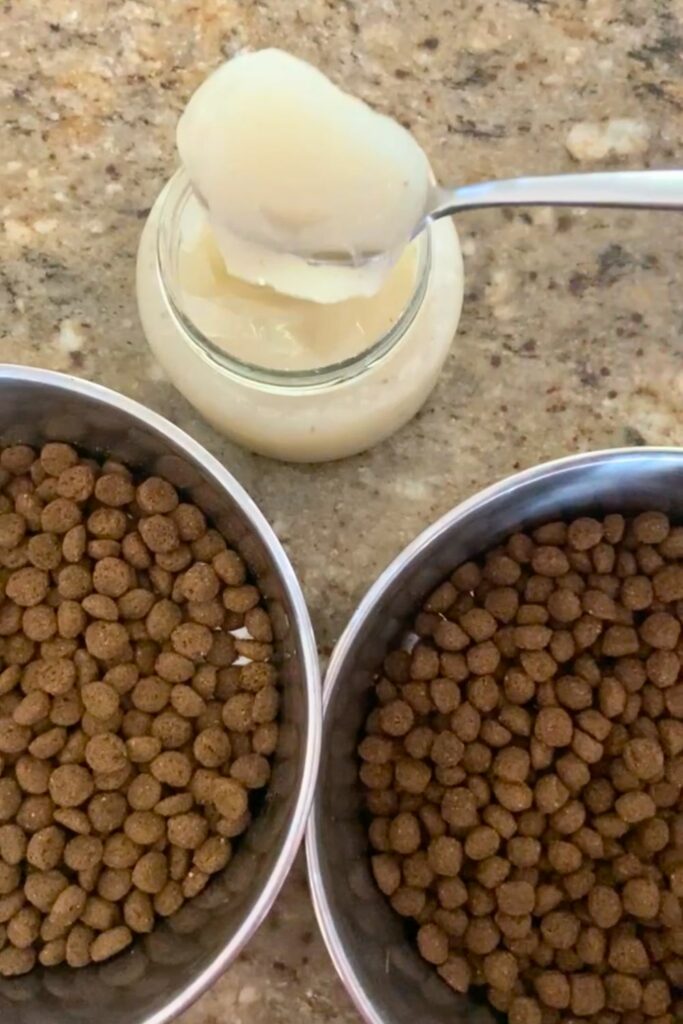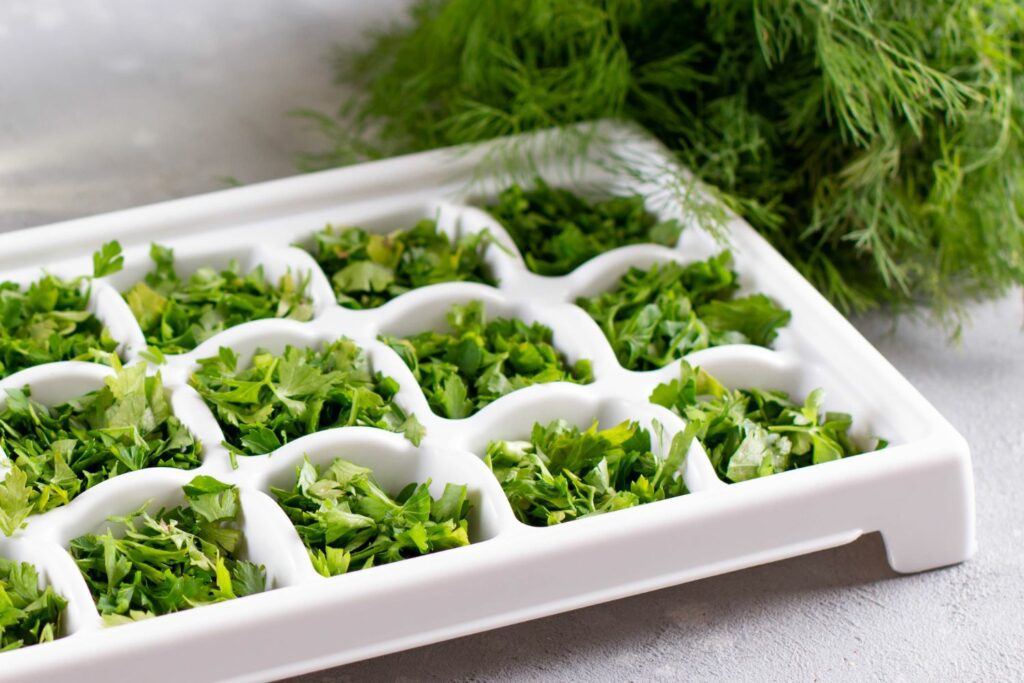Homemade Bone Broth for Dogs [Easy & Nutritious]
 Synne Hemsen Berg
Synne Hemsen Berg
Bone broth is a tasty, easy, nutritious, and cheap addition to your dog’s diet. In addition to containing many healthy nutrients, bone broth is an appetising topping for dogs who do not have a great appetite. Dogs may lose their appetite if they are sick, recovering from a disease, pregnant, lactating, or picky eaters. This bone broth recipe requires only a few ingredients and can be made in large portions to be frozen for later use. You will spend 10 minutes prepping this dish, and then you can leave it to simmer for a minimum of 4 hours.
Benefits of giving dogs bone broth
Broth made from bones contains minerals, good fats, glycoproteins, amino acids, collagen, and glucosamine. This can help maintain healthy joints, skeleton, immune system, skin, and fur.

Collagen and glucosamine are important building blocks for cartilage, skin, and connective tissue. Adding a few tablespoons of broth to your dog’s food can therefore help maintain good joint mobility. Collagen and glucosamine also have anti-inflammatory properties.
your dog’s digestive system can benefit from homemade bone broth. The gelatin and amino acids in the broth help maintain normal intestinal integrity and flora. Additionally, the anti-inflammatory effect of collagen and glucosamine can help reduce the symptoms of leaky gut syndrome. If your dog shows signs of intestinal issues, such as diarrhea, constipation, and flatulence, broth may be helpful to try. If your dog has a sensitive stomach, we advise that you start by making a weaker bone broth that has cooked for a shorter time (about 4 hours). Bone broth also has a dehydrating effect.
Adding bone broth to your dog’s diet can improve overall pet health as well as make for more interesting cooking options for your furry friend.
Bone broth can be useful for:

- Picky dogs to make dog food more tempting
- Dogs that have lost their appetite – this often happens with sick or elderly dogs, and during recovery
- Dogs with joint and/or skin problems
- Dogs with gastrointestinal problems
- Dehydrated dogs (add some bone broth to the water bowl to tempt the dog to drink more fluids)
- Pregnant and lactating dogs
Tips and tricks
- Save energy and the environment by making the broth in a Wunderbag. They also support the upliftment of women in South Africa.
- Make a big batch at a time and freeze in smaller portions that you thaw when needed. Large ice cube trays or small Tupperware can be perfect to freeze portions in.
- Bone broth should not boil, but rather steep/simmer on low heat for several hours.
- Freeze leftovers from peeling and cutting vegetables such as carrot and celery tops and use it in your bone broth. Only use vegetables that are safe for dogs.

- Do not give your dog store-bought broth or stock as this often contains salt, onions and other additives that are not good for your dog. Additionally, they may not have the same health-promoting effect as homemade bone broth.
- You can make broth from vegetables only, which can also be good for the dog’s health. However, a vegetable broth will not contain collagen, glucosamine and amino acids that are beneficial for joint, skin and intestinal health.
Making homemade bone broth for dogs
Bones and water are the only essential ingredients to make bone broth. An acid such as lemon or apple cider vinegar should be added, because it helps to extract the minerals (calcium, magnesium, and potassium) from the cooked bones. You can also add vegetables and herbs to give the broth more flavour and nutrition.
Bone Broth Ingredients
- 2l water
- 1kg bones and knuckles from free-range animals
- 3 tablespoons lemon juice or apple cider vinegar

Optional vegetables to include:
- 2 carrots
- 2 celery stalks
- 1 celery root
Optional herbs to include at the end of cooking:
- Rosemary
- Parsley
- Mint
- Basil
- Oregano
We do not recommend adding onions, leeks, or other “allium” vegetables as they contain thiosulfate, which is toxic to dogs in large quantities and may compromise your dog’s immune system.* Also, do not add salt as dogs will get their recommended daily dose of salt from their normal diet. It may be possible to buy bones from the freezer section in your grocery stores or your local butcher (some grocery stores also have a butcher in-store).
*Some holistic vets use garlic as a remedy for some dogs. Consult with a holistic veterinarian if you wish to give your dog garlic.
As pet parents, we want to ensure that our fur friends are consuming ingredients that are beneficial to their health. Add bone broth to their balanced diet a few times a week/month to maintain a healthy gut, supple joints and a shiny coat.
Method (video below)
- Preheat the oven to 180 degrees Celcius.
- Place the raw bones on a baking sheet and bake in the oven for 30 minutes until browned.
- If you are adding vegetables, wash and chop these into large 3cm chunks.
- Place the bones, lemon juice, and vegetables in a large pot and cover with water. Make sure that the bones are covered with water during the cooking time and add water as needed.

- Bring the pot to a boil, then turn down the heat and put on a lid or put the pot on a Wunderbag.
- Let the bone broth lightly simmer on low heat for 4 to 16 hours. The longer you simmer the bone broth the more gelatin and nutrients are extracted.
- Strain the bone broth and add fresh herbs if desired. Then fill smaller containers with bone broth (for example, clean jam jars/Tupperware/ice cube trays) – remember that liquid expands when it freezes.
- The bone broth stays fresh in the fridge for 5 days and in the freezer for 6 months.
When the bone broth cools down, it will become jelly-like. If the bone broth does not become gelatinous, it may be because the bones used did not have enough cartilage – or that it did not simmer long enough. This is not a problem; the broth will still be full of nutrients and good flavour for your dog.

Tip: place some herbs in an ice cube tray and top with bone broth before freezing
Frequently Asked Questions About Homemade Bone Broth for Dogs
Is bone broth safe for all dogs?
Yes, bone broth is generally safe for most dogs. However, introducing your own bone broth or any new food item gradually is always best, especially for dogs with sensitive stomachs or specific dietary restrictions. If you have concerns, consult your veterinarian first.
How often can I give my dog bone broth?
Bone broth can be added to your dog’s diet a few times a week. It’s a supplement, not a meal replacement, so it should be given in moderation alongside a balanced diet for optimal health benefits. Precise portions of how much bone broth to give should be dependent on the size of your dog.
What kind of bones should I use for making bone broth for dogs?
You can use chicken, beef bones, or turkey bones. Joint bones are great for gelatin, while marrow bones add flavour and nutrients. Always ensure the bones are raw and unseasoned.
Can I add vegetables to the bone broth?
Yes, you can add dog-safe vegetables like carrots, celery, and green beans to the broth for extra nutrients. Avoid onions and garlic, as they are harmful to dogs.

Can I give my puppy bone broth?
Yes, puppies can have the benefits of bone broth too. It’s a nutritious addition to their diet but should be given in moderation.
How long can I store homemade bone broth?
Bone broth can be stored in the refrigerator for up to 5 days. For longer storage, freeze it in an airtight container or ice cube trays for up to a year.
Can bone broth help with my dog’s joint problems?
Bone broth for dogs is rich in collagen and glucosamine, which are beneficial for joint health. While it’s not a cure, it can complement your dog’s diet to help support joint health, mobility, and comfort.
Should bone broth be given to dogs with specific health issues?
If your dog has health issues, especially related to the kidney or liver, it’s best to consult with your vet before introducing bone broth into their diet.

![Homemade Bone Broth for Dogs [Easy & Nutritious]](https://www.nalahealth.dog/za/app/uploads/2022/05/Blog-banner-5-1-1024x384.jpg)